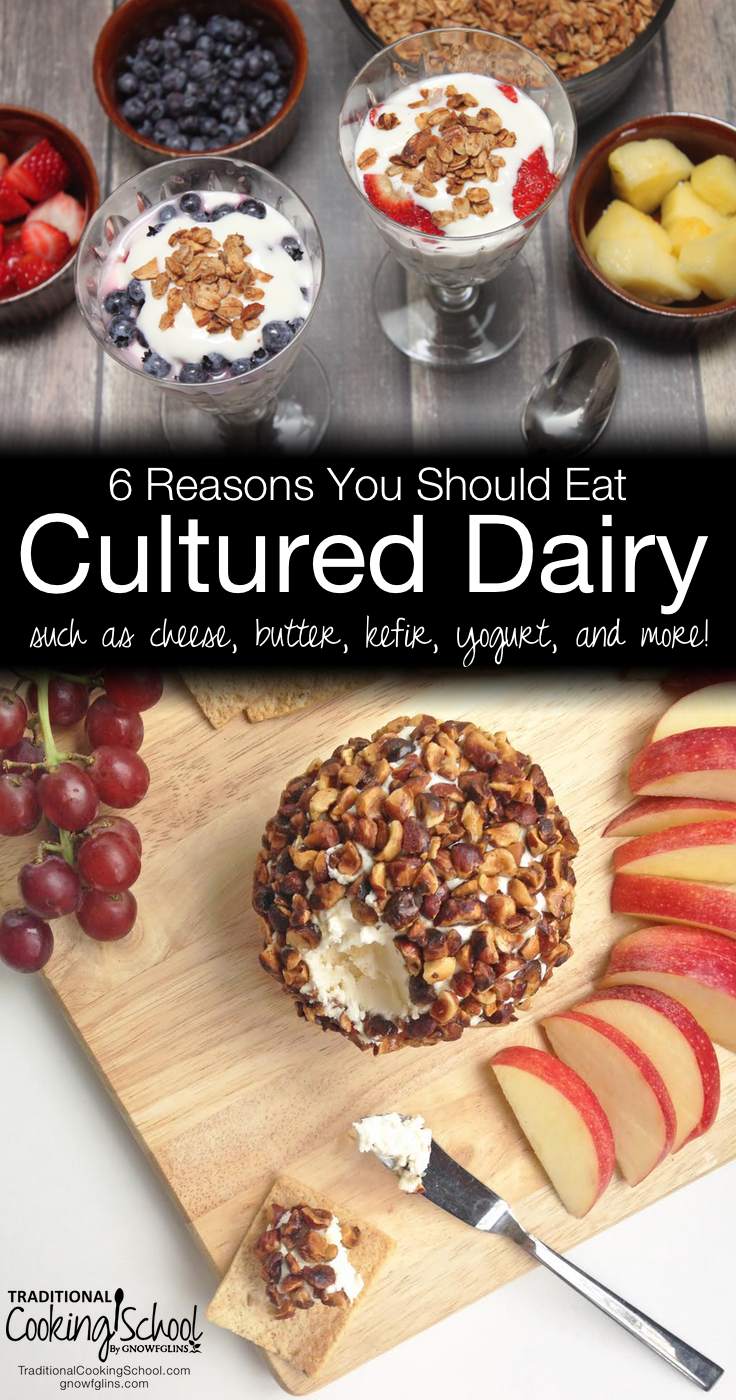
Why should you eat cultured dairy?
Oh, the reasons abound… 😉 From cheddar cheese to sour cream to kefir to butter, these cultured dairy foods are delicious and so nourishing!
Without further ado, here are 6 reasons you should eat cultured dairy!
Disclaimer: Of course, if you have a dairy allergy or other concern, do what is right and most healing for your body. Even cultured dairy, although typically very nourishing, may not be the right fit for every individual.
# 1 — Cultured Dairy Is Full of Probiotics
With each serving of cultured dairy, you consume a range of beneficial bacteria and/or yeast. Kefir, arguably the most probiotic of them all, can contain up to 50-something beneficial strains! These organisms colonize your gut, keep pathogens in check, and help guard against illness.
#2 — Cultured Dairy Improves Digestion
When the beneficial organisms colonize your gut, they help you get more nutrients from your food. If the milk or cream was pasteurized initially, culturing restores many of its enzymes. These enzymes then help the body absorb calcium and other minerals.
Of particular interest is lactase, the enzyme that breaks down the milk sugar lactose. Many lactose-intolerant people can actually eat cultured dairy without ill effects because the lactose is gone.
In addition to this, the culturing process breaks down one of the milk proteins: casein.
#3 — Cultured Dairy Adds Vitamins
Vitamins B and C increase during the culturing or souring of dairy foods. Not much more to say here! Most likely, we could all use some more vitamins. 🙂
#4 — Cultured Dairy Sours, Not Spoils
When starting with raw milk*, cultured dairy sours instead of spoils over time.
You see, beneficial organisms — either naturally present in raw milk, or added in the form of a mother culture — colonize the milk and hold putrefying organisms in check. Over time, and in the right conditions (such as cool storage), the beneficial organisms produce lots of lactic acid. This is another form of natural preservation! The “bad guys” don’t want to live in the acidic environment with lots of “good guys” around.
Aging time also develops flavor. From an aged cheese to super-sour kefir, this is all normal behavior with cultured dairy.
*There may be cultured dairy foods using pasteurized milk that last a long time — such as aged cheeses.
#5 — Cultured Dairy Is Delicious
Your family may not care for sauerkraut… yet. 😉 But with all the cultured dairy foods out there — like cultured butter, buttermilk, sour cream, cheddar cheese, feta cheese, yogurt, kefir, and piima — your picky eater is bound to find something he/she likes!
#6 — Finally, Cultured Dairy Embraces God’s Design
The Bible doesn’t tell us how to prepare our food, dairy included. But God’s Word does tell us how highly milk is regarded.
“And I am come down to deliver them out of the hand of the Egyptians, and to bring them up out of that land unto a good land and a large, unto a land flowing with milk and honey.” –Exodus 3:8
In that refrigerator-less, non-industrial promised land “flowing with milk and honey,” excess milk would have spontaneously soured and preserved itself.
Thanks be to God that He provided the means for natural fermentation — and that traditional peoples passed down their practices from generation to generation, until here we are today!
For even more information on cultured dairy, check out our Cultured Dairy & Cheese eCourse.
What is your favorite cultured dairy food? Why do you eat cultured dairy?
...without giving up the foods you love or spending all day in the kitchen!

2 free books:
Eat God's Way
Ditch the Standard American Diet, get healthier & happier, and save money on groceries...
We only recommend products and services we wholeheartedly endorse. This post may contain special links through which we earn a small commission if you make a purchase (though your price is the same).


I love how raw milk “sours instead of spoils”, as you said. I think that is my most favorite part of raw dairy- before, when we purchased store bought milk, those cartons of “bad milk” were so nasty. Now, our raw milk and dairy products just change and get better and you never really have a need to throw it away!
Looking forward to starting this class! 🙂
I just had my first experience with cultured butter. It was 3.99$ a stick and worth every penny! It’s so delicious spread on rough bread.
Wardee I’m really looking forward to it, also I just found at our Safeway Organic Milk that is only pasturized not ultra. p.. so I’m so happy. I wish it were raw from a dairy,,, but I’m thanking God and using what I have.
I’m looking forward to the class. I’m still learning it all.
Hi Wardee, do you possibly know where I can find nutritional content listings for homemade yogurts? I am hoping to make piima soon, in part so my mother can have it too. For her current eating plan, she is tracking carbs/sugar, calories, etc., and it would be nice to have numbers for her.
Soli — That’s a good question! Here’s a “nutrition” label for plain, whole milk yogurt:
http://nutritiondata.self.com/facts/dairy-and-egg-products/104/2
I would think it would be similar to homemade yogurt, even piima. The beneficial organisms consume the milk sugar similarly. What do you think?
Wardee, thanks. I should have figured it would have been something similar for all plain yogurts. I wish I had time for your classes!
I have to admit that as much as I love the other reasons (and am definitely trying to work more cultured foods into my diet because of them) I love reason five- tastes great!
I can’t do sauerkraut yet without gagging, and I’m a huuuge picky eater. But give me something that is healthy and tastes great? Okay!
Slightly overwhelmed with what kit to purchase. I don’t have any of the items on hand (accept for the milk). Any pointers on which one to lean towards? I’ve already read the outline and difference, but I mostly couldn’t tell you what much of it means as far as ingredients and tools.
Thanks for any direction.
Gabreial — We can discuss that on the forums. 🙂 Welcome!
Thanks, I published my question there.
Wardee,
The new course sounds great. I don’t think, however, that it is going to work for me 🙁 I am waiting til the end of the week to be sure so I’ll let you know.
Toni
PS…I am so excited to see you’re an affiliate with Bulk Herb Store…Yay! I am wanting to put an order in with them sometime soon…I’ll try to remember to buy through you! I love her youtube videos! She is so lively!
Ahh… 🙁 I’ll be sad, but I understand if you can’t make it.
Thanks for remembering me when you order with the Bulk Herb Store. 🙂
I’m trying to decide if this course will work for me. I’m lactose intolerant but can eat my homemade yogurt because I culture it for at least 20 hours, so most of the lactose (if not all?) is used up by then.
Will the other foods in this course be the same? Could a lactose intolerant person eat them?
Jennie — That’s one of the greatest benefits of cultured dairy! Most of the lactose is eaten up by the beneficial organisms. If you can eat your homemade yogurt, you’ll likely be able to eat almost everything we make in this class. Most foods will be cultured for 12 to 24 hours — and you can always go more.
And also, if you begin with raw dairy, the enzyme lactase is present to help you digest any lactose still remaining. In addition, culturing helps replace the lactase if the milk was pasteurized in the beginning.
So, my answer is yes! I think you’ll do very well with the foods in this class. That would be my hope for you. 🙂
Wardee,
You mentioned that culturing the dairy would break down the casein. In our family I suspect that we have some gluten sensitivity ( I kinda believe everyone does to a degree ) I have been reading that the protein in dairy ( casein ) can act like gluten in our bodies. Do you know anything more about that? Would making my own cheese, sour cream … make that a non issue? As of now we get raw milk from an Amish friend of ours, and I have access to as much as I need. We all love cheese, butter, well anything dairy, but I was considering taking dairy out of our diet, just to see if it would help. We would all be really sad if we could not have melted yummy cheese. Any thoughts would be great!
Katie — I don’t know much more than what I already shared. I think it is worth trying for you to culture your own dairy foods and see how you do. I’d suggest starting with at least a 24 hour culturing stage, which is easy for butter, sour cream, and any cheese really! By the time a cheese is made and sits out overnight — its been aging for at least 24 hours. If those trouble anyone, try aging longer. You won’t really know until you try! I hope you’ll keep in touch about it because I’m curious about this, too.
Can you do this with goats milk?
Hi Christine,
Yes, you can!
Millie
GNOWFGLINS Support Team
Unfortunately, for some of us who get headaches, cultured foods are triggers.
I just tried a local, organic cottage cheese and have had a mild headache for the last couple days.
You might want to mention this as a precaution, if you haven’t already.
So glad to hear you quote God’s plan for our lives out of His very Word ” The Bible”. I’m a fan of yours & plan to incorporate your eating plan extensively in my diet. Ignorance is not bliss ! Over the years I’ve developed a leaky gut, countless allergies & other health problems. Prayerfully, following your diet plan (eating healthy) and God’s healing promises, I’d be able to reverse these health issues. Thank you so much for your input into life ! A very Happy Mother’s Day to you !